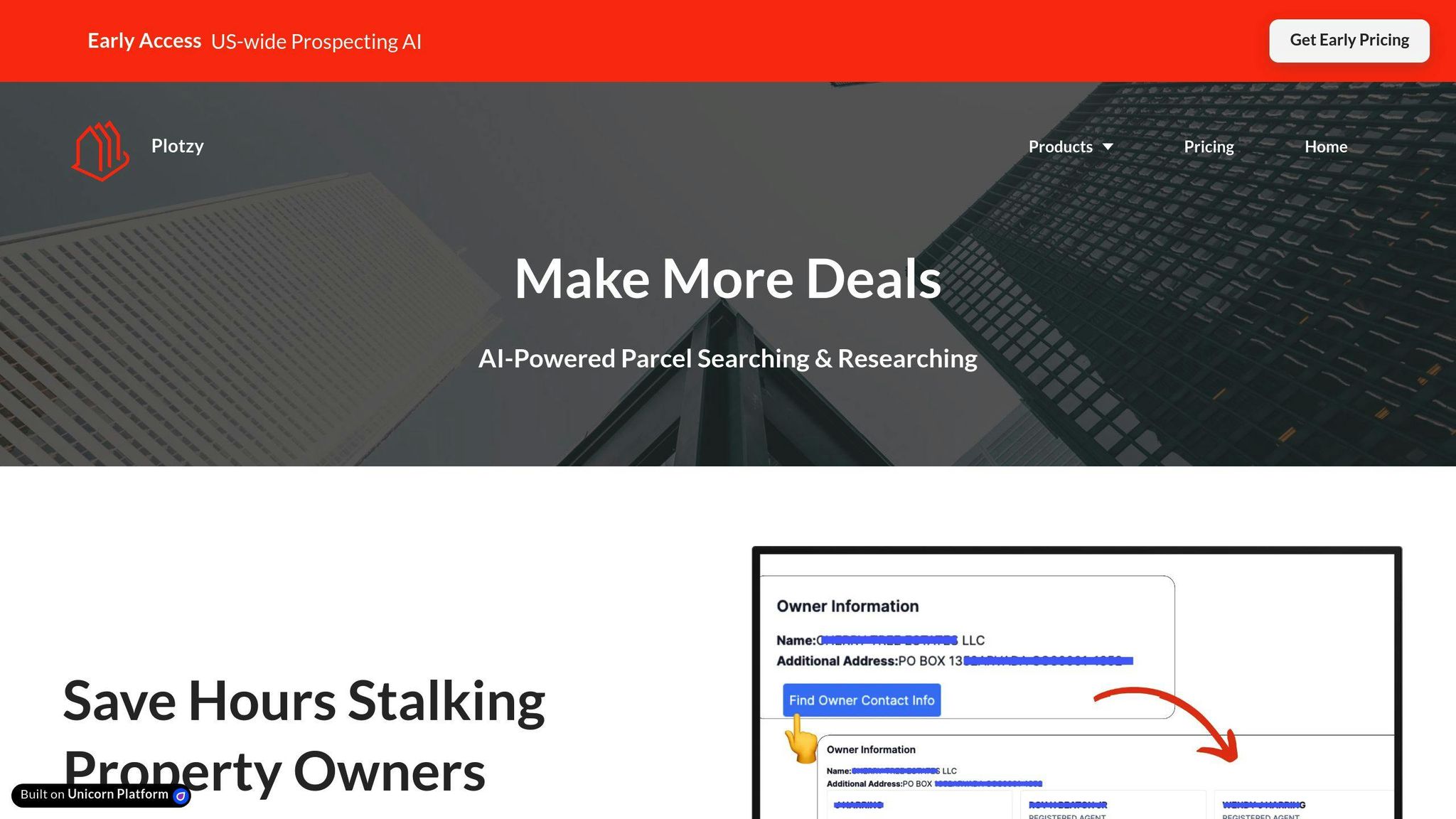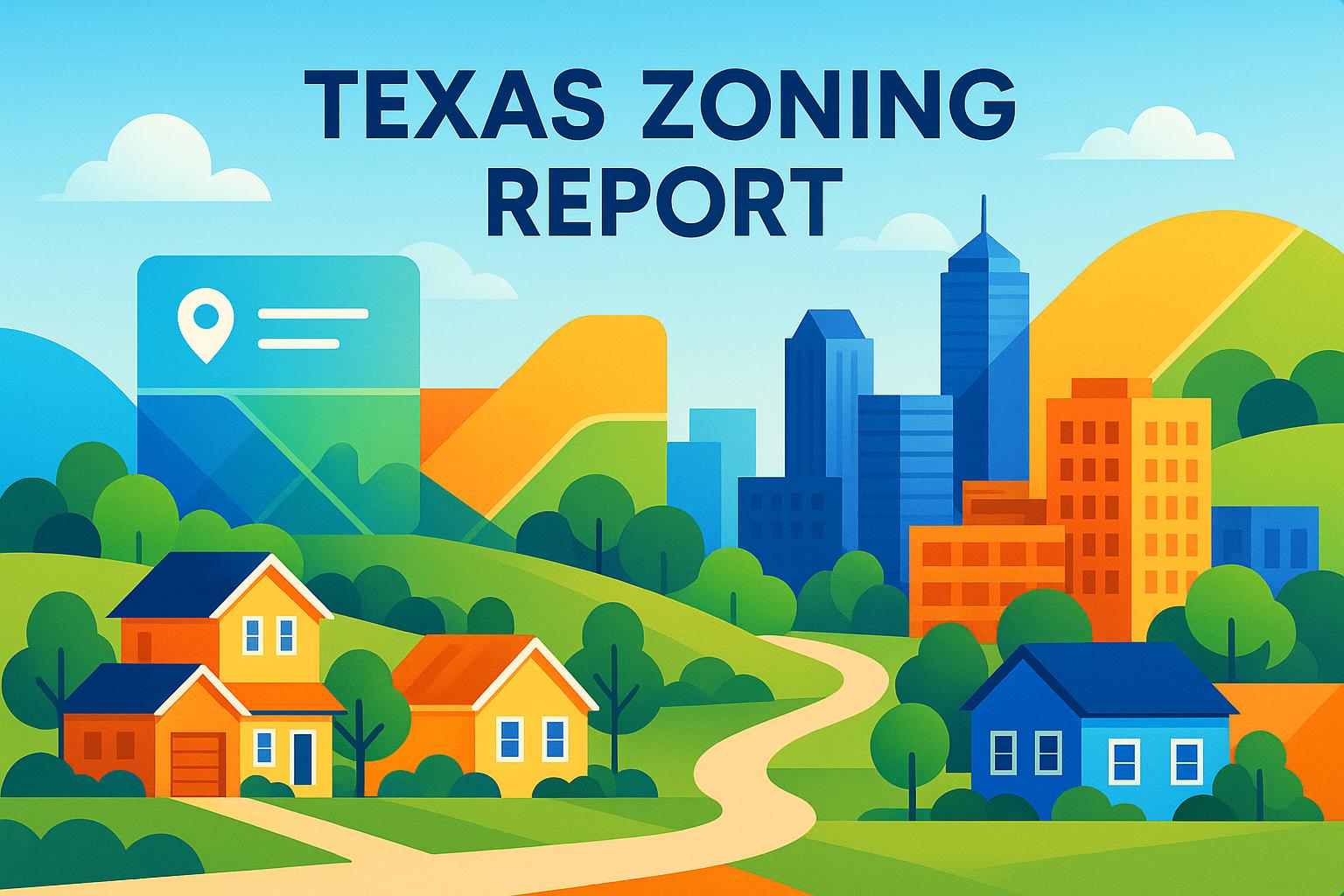AI is transforming how real estate professionals evaluate climate risks, helping investors protect property values and make smarter decisions. With $92.9 billion in U.S. damages from extreme weather in 2023 and $7.5 trillion in real estate at risk globally, understanding climate threats is critical. AI tools like Climate Alpha, CoreLogic, and Jupiter Intelligence provide insights into flooding, wildfires, and rising sea levels, offering predictive models and real-time data to guide investments.
Key Takeaways:
- High-Risk Areas: Properties in flood or wildfire zones can lose 10-30% of value.
- Resilient Properties: Climate-resilient buildings gain a 5-15% price premium.
- AI Tools: Platforms like Plotzy combine zoning and climate data for better decision-making.
- Market Trends: Inland areas are gaining demand as coastal regions face declining values.
AI simplifies climate risk analysis, making it easier to identify safer investments and adapt strategies to a changing climate.
Catastrophic Climate Risk Assessment with Big Data and AI
AI Tools for Climate Risk Analysis in Real Estate
AI-powered platforms are changing the game for real estate professionals by delivering detailed climate risk insights. These tools simplify complex climate data, turning it into practical information for property investment and portfolio management.
Features of AI-Based Climate Risk Platforms
Platforms like CoreLogic and Jupiter Intelligence are leading the charge in climate risk analysis. CoreLogic's Climate Risk Analytics evaluates 13 different climate-related risks, while Jupiter Intelligence uses real-time data to adjust property values based on evolving climate factors.
Here’s what these modern AI platforms bring to the table:
| Feature | Purpose | How It Helps |
|---|---|---|
| Physical Risk Assessment | Identifies risks like floods and wildfires | Highlights immediate threats to properties |
| Property-Level Analytics | Examines specific building details and location | Pinpoints risks for individual assets |
| Predictive Modeling | Forecasts future climate impacts on properties | Aids in long-term investment strategies |
| Real-Time Monitoring | Keeps tabs on climate events and market shifts | Enables quick responses to emerging risks |
Specialized tools like Plotzy add another layer to decision-making by combining zoning and property research with climate risk insights.
Using Plotzy for Property Research and Risk Analysis

Plotzy goes beyond climate data by integrating zoning information and property research. This gives investors a comprehensive view, helping them identify properties that balance regulatory requirements with environmental resilience.
"Real estate success depends on integrating climate risk into decisions", says Annu Talreja from Accacia.
These tools are just the start of how AI is reshaping real estate in a world increasingly focused on climate challenges.
How Climate Risks Affect Real Estate Values
AI-powered climate risk evaluations are reshaping how properties are valued worldwide. These advanced tools uncover how climate change influences real estate markets, offering new insights into shifting property values.
The Connection Between Climate Risks and Property Prices
Climate risks now play a direct role in determining property values. AI analysis has shed light on how specific locations and property types contribute to the estimated $7.5 trillion in potentially stranded real estate assets. The financial effects vary based on the type and level of risk.
| Risk Category | Value Impact | Market Response |
|---|---|---|
| High-Risk Areas (Flood/Fire) | 10-30% decrease | Lower buyer interest, stricter financing options, higher insurance costs |
| Climate Resilient | 5-15% premium | Increased investor demand, favorable financing options |
Examples of Market Changes Due to Climate Risks
AI platforms like Climate Alpha offer detailed insights into how markets are shifting, enabling stakeholders to measure risks and adjust strategies accordingly. As noted by Climate Alpha's founder:
"The real estate sector faces compounding challenges, from high interest rates to climate impacts, potentially decimating vulnerable regions."
Market trends identified by AI show distinct patterns:
| Region | Climate Risks and Market Impact |
|---|---|
| Key Markets | Florida and California see declining values in high-risk areas, while inland zones gain demand. |
With real estate accounting for 40% of global emissions, properties designed to withstand climate risks are increasingly sought after, often commanding price premiums. Meanwhile, high-risk assets face declining interest and value. Investors are turning to AI tools to pinpoint safer opportunities and protect their investments.
sbb-itb-11d231f
Using AI to Shape Real Estate Investment Strategies
AI is transforming real estate investment by helping investors make smarter decisions that consider both immediate and long-term climate risks.
Adding Climate Risk Analysis to Investment Research
AI's ability to evaluate climate risks allows investors to enhance their due diligence processes. Platforms like CoreLogic's Climate Risk Analytics combine physical risk assessments, financial projections, regulatory factors, and market trends into a single, actionable framework.
| Due Diligence Component | AI-Enabled Analysis |
|---|---|
| Physical Risk Assessment | Flood zones, heat exposure, extreme weather risks |
| Financial Impact Analysis | Value changes, insurance implications |
| Regulatory Compliance | Environmental and building code requirements |
| Market Analysis | Demand shifts, pricing trends |
"Traditional valuers would tell you it's all in the cap rate, or it's all in my opinion. We are deconstructing it and looking at the quantifiable aspects impacting the value of a property and drilling down into real specifics." - Tyrone Hodge, Global Head of Risk Advisory at JLL
Building Portfolios Focused on Resilient Properties
AI tools like Climate Alpha are helping investors identify properties that can withstand climate challenges. These tools analyze factors such as location stability, energy efficiency, and market strength. Climate Alpha’s scorecard dashboard evaluates resilience based on key criteria:
| Resilience Factor | AI Assessment Criteria |
|---|---|
| Location Quality | Infrastructure stability, market strength |
| Building Features | Energy efficiency, structural integrity |
| Economic Viability | Value retention, market demand |
| Risk Mitigation | Adaptation measures, insurance costs |
Plotzy further supports investors by using AI to merge zoning data with climate risk assessments. This helps pinpoint properties better equipped to handle environmental challenges.
"Climate change is reshaping the global real estate landscape in profound ways... The future of real estate now hinges on how well stakeholders integrate climate risk into their decision-making processes." - Annu Talreja, Founder of Accacia
AI-driven tools are reshaping the real estate market, giving investors the insights they need to address climate risks and build stronger portfolios.
The Future of AI in Real Estate and Climate Risk Assessment
Advancing AI Models for Climate Risk
AI technology is evolving with the integration of IoT sensors and blockchain, making it more precise in assessing risks for individual properties. These tools can now evaluate multiple threats - like flood risks and heat exposure - at the same time, providing a well-rounded view of potential climate challenges.
ZestyAI is a standout in this field. Their property-level analytics, approved by the California Department of Insurance, show how AI can be used for regulatory and risk management purposes. As Kumar Dhuvur from ZestyAI puts it:
"AI will not only help in setting better rates, but it will also help improve segment risk. But the question is, what do you do with those insights?"
AI's progress is evident in key areas of climate risk assessment:
| Assessment Component | Current Capabilities | Future Potential |
|---|---|---|
| Risk Prediction | Property-level analysis | Neighborhood-specific insights |
| Data Integration | Climate and weather data | IoT sensor networks |
| Validation | Regional modeling | Property-specific accuracy |
| Financial Impact | General market trends | Precise property valuations |
These advancements are making it easier to incorporate climate risk data into larger real estate strategies.
Broader AI Use in Real Estate
AI tools are now being used to seamlessly blend climate insights into property research and investment planning. The range of applications in real estate is expanding rapidly. For example, in Singapore, companies like Accacia are creating tools to help investors and developers navigate climate risks while finding high-potential areas.
Plotzy is another example. They use AI-powered zoning analysis alongside climate data to help users:
- Analyze how resilient a property is under various conditions
- Access detailed local government information
- Create detailed risk assessment reports
Kumar Dhuvur of ZestyAI highlights the competitive edge early adopters will gain:
"The carriers that adopt AI first will definitely see a massive benefit. As other carriers cede market share, the forward-thinkers will be able to protect that market share and garner a share of the profits by leveraging models that manage risk better."
Singapore’s S$100 billion investment in resilience projects is fueling the development of AI tools that improve climate risk management for individual properties and entire portfolios.
Conclusion: AI's Role in Managing Climate Risks in Real Estate
Key Takeaways for Real Estate Professionals
AI tools are transforming how natural disaster risks are evaluated, helping protect investments. These advanced platforms provide detailed property-level analytics and localized insights, enabling professionals to make informed decisions.
| Assessment Type | Business Impact |
|---|---|
| Property Value Predictions | Spot properties with potential for long-term growth |
| Risk Assessment | Understand exposure to climate-related threats |
| Sustainability Ratings | Address ESG investment priorities |
| Municipal Compliance | Keep up with changing regulations and codes |
This shift highlights the importance of leveraging AI-driven insights to navigate the challenges posed by climate risks in real estate.
Using AI Tools to Tackle Climate Challenges
As climate risks reshape real estate markets, staying competitive means integrating AI tools into your strategy. Platforms like Plotzy provide powerful features, such as unlimited property searches and instant zoning insights, helping investors pinpoint climate-resilient properties. By combining zoning data with climate information, Plotzy allows users to align their investments with both regulatory requirements and environmental resilience.
Those adopting AI tools early are staying ahead by addressing climate risks proactively and meeting market demands. For instance, Singapore's S$100 billion commitment to climate resilience shows the scale of action needed to face these challenges.


